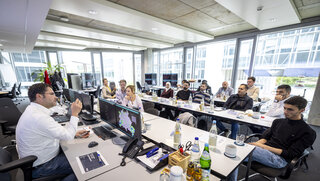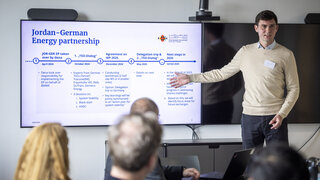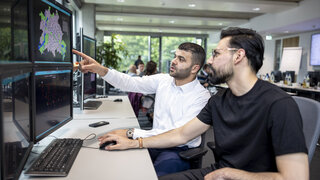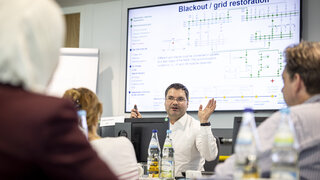NEPCO - expert tour to Berlin and 2nd TSO-Dialog
Berlin
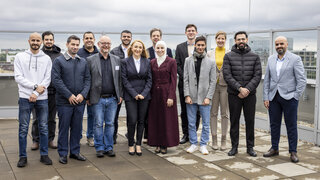
How can the power grid remain secure and stable even with a growing share of renewable energy?
This question was at the center of the visit by Jordanian power grid experts as part of the German-Jordanian Energy Partnership. A group of experts from the state-owned transmission system operator (TSO) National Electric Power Company (NEPCO) engaged in intensive discussions with experts from the German Energy Agency (dena), Elia Grid International, the German TSO 50Hertz Transmission GmbH, GridLab, and Guidehouse.
Germany and Jordan face similar challenges: with the successful expansion of solar and wind energy, these resources must increasingly contribute to grid stability. This brings new requirements for both the units themselves and for grid operations.
To ensure a hands-on and practical exchange, the Jordanian experts took part in a two-day training at GridLab, a specialized training center for power grid security in Berlin. In the simulated control center, operations engineers were able to test various scenarios—such as how to isolate grid faults or initiate countermeasures in the event of voltage or frequency deviations.
In addition to the visit to GridLab, there were two days of intensive exchanges on various aspects of grid planning and operations at the German TSO 50Hertz. A key focus was on strategies for managing the increasing share of renewable energy generation in the grid. Specifically, discussions centered on the measures 50Hertz is taking to ensure system stability while becoming less reliant on inherently grid-stabilizing fossil fuel power plants. Initial steps already taken include the deployment of new operational equipment such as synchronous condensers or STATCOMs. In the medium term, a market mechanism is being developed to integrate units that contribute to system stability. In the long term, adapting grid connection codes is a potential solution.
This working visit is a prime example of how energy partnerships foster cross-border cooperation and hands-on knowledge transfer in the energy transition. We thank all participants for their contributions!
